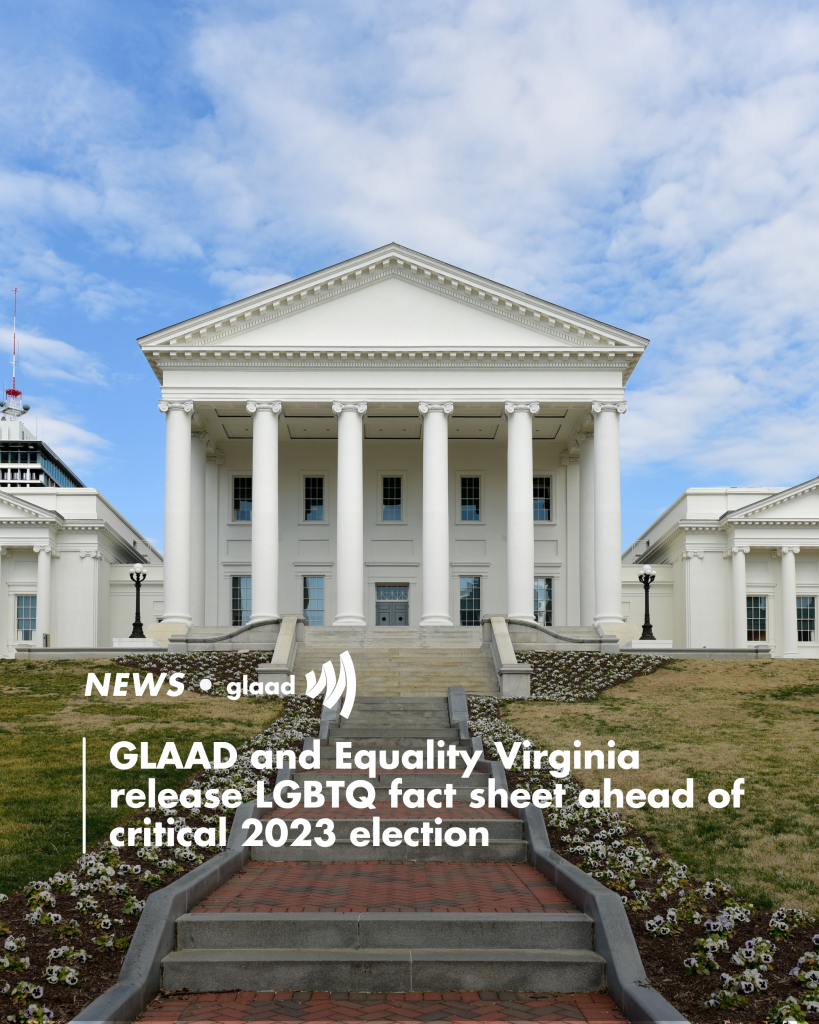GLAAD, Equality Virginia on What’s at Stake for LGBTQ Voters in Critical 2023 Election
Today GLAAD, the world’s leading LGBTQ media advocacy organization; and Equality Virginia, the leading statewide LGBTQ group advocating and organizing across the Virginia Commonwealth, released a fact sheet for reporters and Virginians on key issues and considerations for LGBTQ voters and allies ahead of the critical election in the state this November.
The Virginia election will mark one of the most consequential statewide elections this year, with the entire state legislature up for reelection including all 40 Senate seats and all 100 House seats, as well as multiple local school board and Board of Supervisors races, and a number of local referendums. Virginians can visit the state’s Department of Elections website to track specific races in their region.
“LGBTQ residents and their loved ones in Virginia have the opportunity to sway the vote in one of the most important elections in recent history,” said Sarah Kate Ellis (she/her), President and CEO of GLAAD. “GLAAD research shows that the turnout of LGBTQ people at the ballot box was one of the key factors in the last presidential election; and we can leverage that momentum now in localized races that will have a major impact on our community. This is about ensuring fair opportunities for students in schools, equal treatment for employees in the workplace, and dignity for LGBTQ Virginians in all aspects of their lives.”

“This election comes at a critical time, following a legislative session in which the general assembly introduced the most anti-LGBTQ bills in its history. It’s an opportunity to build a pro-LGBTQ majority at the state and local level – one that sees us, respects us and fights for our dignity,” said Narissa Rahaman (she/her), executive director of Equality Virginia. “With all legislative races taking place this year in redrawn districts, it’s more important than ever that Virginians take proactive measures to know where to vote on Election Day and to encourage their family and friends to vote, too. Our vote is one of the most powerful tools we have to shape our future.”
According to the Williams Institute, 257,000 people in Virginia – or 3.9% of the population – identifies as LGBTQ, not including youth under 18 years old.
Virginia is currently the only Southern state with laws explicitly prohibiting discrimination against LGBTQ people, passed in 2020 by the pro-equality majorities in the legislature and previous governor. Virginia’s legislature also passed protections against the LGBTQ panic defense and against the so-called practice of conversion therapy, and eased the process for transgender and nonbinary Virginians to update their identity documents. In his first two years in office, Governor Glenn Youngkin’s administration has removed critical resources and undermined LGBTQ protections:
-
Virginia’s Department of Education released new model policies for K-12 students rescinding transgender-inclusive policies enacted by the previous administration. The new policies, which must be voted on by school boards before being adopted at the local level, ban transgender students from using school facilities that match who they are, forcibly out students to unsupportive parents, and make it more difficult for students’ names or pronouns to be respected at school. The policy changes resulted in walkouts led by thousands of students.
-
Youngkin stated that local school districts “don’t really have a choice” in adopting the policies and warned that they could face legal retribution if they do not comply.
-
The Youngkin administration also removed LGBTQ youth resources previously hosted on Virginia’s Department of Health website.
-
Youngkin has opposed the freedom to marry for same-sex couples and previously campaigned using transphobic and anti-LGBTQ rhetoric. U.S. Supreme Court Justice Clarence Thomas called for the U.S. Supreme Court to reconsider legal precedent in cases such Lawrence v. Texas and Obergefell v. Hodges, which respectively decriminalized same-sex relationships and upheld same-sex couples’ freedom to marry. Should those cases be overturned, protections for same-sex couples may return to the states.
-
GLAAD is documenting Youngkin’s record of anti-LGBTQ policy and rhetoric via the GLAAD Accountability Project, here.
Although no specific anti-LGBTQ laws passed in Virginia in 2023, anti-equality lawmakers filed approximately a dozen anti-LGBTQ bills, the majority of which specifically targeted transgender youth, including baseless restrictions on school sports participation and forced outing to parents. The push to enact anti-LGBTQ bills this session marks a stark contrast from 2020 and 2021, when former Gov. Ralph Northam signed multiple pro-LGBTQ bills into law to prohibit discrimination, ban the so-called practice of conversion therapy, and make it easier for transgender and nonbinary Virginians to update identity documents.
LGBTQ Victory Fund has endorsed 14 out LGBTQ candidates running for office in Virginia, including six in the House of Delegates and two in the state Senate. In two historic firsts, if elected to the state Senate, Danica Roem would be the first out transgender state Senator ever elected in the South; and if elected to the House of Delegates, Rozia Henson would be the first out gay Black man elected to the Virginia legislature.
Early voting is currently taking place. Residents can vote early at registrar’s offices until Saturday, November 4. Virginians also have same-day voter registration, and can register to vote on Election Day, November 7, 2023 to cast a ballot in person.
For the full voting guide issued by Equality Virginia with facts on the races and details about how to vote and key deadlines, visit https://issuu.com/equalityva/

